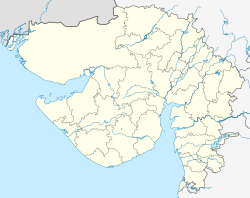Adityana is a census town in the Porbandar District in India in the state of Gujarat. It is located near Barda Hills.
Aadityana | |
|---|---|
Census Town | |
| Coordinates: 21°44′29″N 69°41′54″E / 21.74139°N 69.69834°E | |
| Country | |
| State | Gujarat |
| District | Porbandar |
| Established | 1748 |
| Population (2001) | |
• Total | 17,237 |
| Languages | |
| • Official | Gujarati, Hindi |
| Time zone | UTC+5:30 (IST) |
| PIN | 360545 |
History
editThe town was founded in 1748.[1]
Caves
editIn the hill to the east of the village is a large cave called the cave of Jambavan. Jambavan is an Indian epic character whose daughter Jambavati married Krishna.[1]
Economy
editIn 1839 a quarry was started in the hills to the north-east of the village. This stone is largely exported to Bombay and elsewhere and is commercially known as Porbandar stone. It is a limestone, yellowish white in color, and of compact grain. Locally it is known as makhanio patthar or butter-stone. It is said to possess one excellent quality; walls are built of this cut-stone without any mortar, and it is said that after one rainy season the stones all adhere together so as to form one block.[1]
Demographics
editAs of 2001[update] India census, Aadityana had a population of 17,237. Males constituted 52% of the population and females 48%. The average literacy rate was 53%, lower than the national average of 59.5%; with 60% of the males and 40% of females literate. 16% of the population was under 6 years of age.[2]
References
edit- ^ a b c Gazetteer of the Bombay Presidency: Kathiawar (Public Domain text). Vol. VIII. Printed at the Government Central Press, Bombay. 1884. p. 355.
- ^ "Census of India 2001: Data from the 2001 Census, including cities, villages and towns (Provisional)". Census Commission of India. Archived from the original on 16 June 2004. Retrieved 1 November 2008.
This article incorporates text from a publication now in the public domain: Gazetteer of the Bombay Presidency: Kathiawar. Vol. VIII. Printed at the Government Central Press, Bombay. 1884. p. 355.

